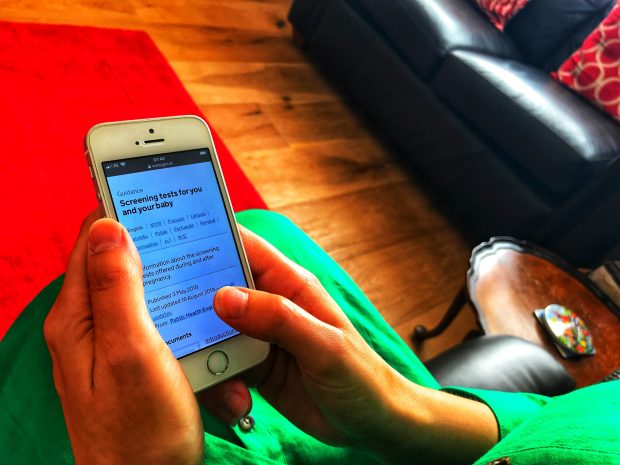
Regular readers of the PHE Screening blog will know about the work taking place to phase out printed national NHS screening leaflets and move to digital information by default.
This includes supporting services in England to move to using digital versions of Screening tests for you and your baby, screening information for babies in special care units and the various NHS antenatal and newborn (ANNB) screening follow-up leaflets.
Digital versions of leaflets:
- work really well on smaller screens, such as phones and tablets
- are in an accessible format that is ideal for people who need extra help using the internet, such as screen readers
- can be saved on to smartphone home screens like an app
- always contain the most up to date information
User research supports transition
Most women benefit from and expect digital information, as our user research with women and midwives into the digital version of Screening tests for you and your baby has shown.
Our project to support 10 ‘early adopter’ NHS maternity providers signposting women to digital screening information was really successful. The digital leaflet contains the 2½ minute animation in its introduction, which provides an ideal overview of screening and which some midwives are finding helpful to include in booking discussions.
Overall, the process was reported by midwives to be very positive and straightforward. Findings suggest only a very small percentage of women need a physical leaflet.
Our research, including an equality impact assessment on the shift from printed media to online information, shows that maximising digital information opportunities is popular. And by providing guidance for getting information to people who are not online, we can ensure no one is disadvantaged.
Next steps for providers
We are now asking ANNB screening providers to signpost to digital information by default.
Providers can continue to use and order printed leaflets until stocks run out, but should only do so for the minority of parents who cannot access digital information.
Once stocks have run out, providers can print out the digital HTML versions of leaflets for people who still need a physical copy. To print an HTML document:
- go to the page with the information you want to print
- press Ctrl+P to get to the print option
- consider customising the pages to miss out the list of contents and the open government licence information
- select the appropriate print option, such as double-sided printing
- press print
Any hyperlinks in the HTML document will be written out in full in the printout.
Support and resources for providers
We have already created a range of resources to help NHS maternity providers make a smooth transition to using the digital version of Screening tests for you and your baby.
Information about how to access these resources is available on request from the PHE screening helpdesk and includes:
- standard text for websites, emails and text messages to signpost women to the digital version of the leaflet
- posters and business cards with QR codes and links to direct people to the digital information
- a handy guide to saving shortcuts on smartphone home screens
We will be developing similar resources to help services signpost parents to the digital versions of all the ANNB screening follow-up leaflets.
We will let you know about these resources, which will include QR codes and short URLs (web address links), as soon as they are available.
Can you help us?
We are keen to make the transition from printed to digital information as smooth as possible.
We would like to hear from anyone who would like to work with us on user research to optimise our support for local services. Please contact the helpdesk if you would like to help.
Thank you for your help in implementing this change.
PHE Screening blogs
PHE Screening blogs provide up to date news from all NHS screening programmes. You can register to receive updates direct to your inbox, so there’s no need to keep checking for new blogs. If you have any questions about this blog article, or about population screening in England, please contact the PHE screening helpdesk.